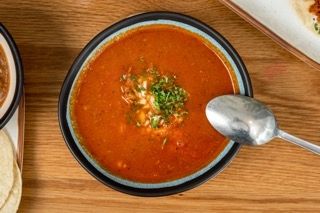Choose best mexican westchester NY cantinas for unforgettable cuisine
Wiki Article
Is Mexican Food Healthy And Balanced? Unloading the Nutritional Advantages of Traditional Components
The question of whether Mexican food is healthy and balanced invites an expedition of its standard ingredients. Beans and corn act as fundamental staples, abundant in protein and fiber. Avocados provide advantageous fats, while numerous herbs and seasonings add taste and health benefits - best mexican westchester NY. With each other, these components produce a tapestry of nutrition. However, the healthfulness of Mexican food typically relies on preparation techniques and section sizes. What role do these elements play in identifying its total nutritional value?The Power of Beans: Healthy Protein and Fiber-Rich Staples
Although usually neglected, beans function as a keystone of Mexican cuisine, providing a riches of dietary advantages. Rich in protein, they are an excellent plant-based option for those looking for to satisfy their nutritional healthy protein requires. This high protein content supports muscular tissue repair and growth, making beans very useful for both vegetarians and meat-eaters alike. Furthermore, beans are an extraordinary source of dietary fiber, which helps in digestion and promotes a sensation of fullness, potentially assisting with weight administration.The selection of beans made use of in Mexican recipes, such as black beans, pinto beans, and kidney beans, adds to a varied taste profile and can improve meals nutritionally. Beans are low in fat and contain essential vitamins and minerals, consisting of folate, magnesium, and iron. Together, these attributes make beans an essential ingredient, delivering both nourishment and sustenance in traditional Mexican fare.

Corn: a Versatile Grain With Nutritional Perks
Corn sticks out as a functional grain basic to Mexican food, commemorated not just for its cooking applications yet likewise for its remarkable nutritional account. As a key ingredient in meals like tortillas, tamales, and pozole, corn gives vital nutrients that add to a balanced diet regimen. Rich in carbohydrates, it serves as a substantial energy source, while likewise being reduced in fat, making it a favorable choice for different nutritional needs.Furthermore, corn is a great resource of nutritional fiber, which assists in digestion and promotes satiety. It includes considerable quantities of vitamins such as B-complex vitamins, which are crucial for basal metabolism. The existence of anti-oxidants, specifically carotenoids, adds to overall health by decreasing oxidative anxiety. In addition, corn is gluten-free, providing to those with gluten level of sensitivities. Overall, the nutritional benefits of corn highlight its value in typical Mexican food and its role in a healthy diet plan.
Avocados: Healthy Fats and Nutrients in Every Bite
Avocados play a substantial role in Mexican cuisine, complementing dishes with their velvety appearance and rich flavor. Beyond their cooking allure, avocados are commemorated for their remarkable dietary profile. They are a rich resource of healthy and balanced monounsaturated fats, which can aid reduced bad cholesterol levels and support heart health and wellness. Furthermore, avocados are loaded with crucial vitamins and minerals, including potassium, vitamin E, and B vitamins, adding to general wellness.The high fiber content in avocados aids food digestion and advertises satiation, making them a beneficial enhancement to any kind Continue of dish. Their special nutrient structure can also support skin health and provide anti-inflammatory advantages. Including avocados right into conventional Mexican dishes or appreciating them as a standalone treat can improve both flavor and nourishment, showing why they are a beloved staple in Mexican food. Overall, avocados provide a scrumptious way to enjoy healthy and balanced fats and vital nutrients in every bite.

Spices and Herbs: Flavorful Wellness Boosters
While enjoying the rich tastes visit this site of Mexican food, one can not neglect the crucial function that spices and natural herbs play in boosting both taste and health and wellness. Active ingredients such as cilantro, oregano, and chili peppers not only add to the vivid taste profile however likewise give significant health and wellness advantages. Cilantro is recognized for its cleansing properties, aiding to get rid of hefty metals from the body, while oregano is loaded with antioxidants and has anti-inflammatory effects.Chili peppers, a staple in several Mexican meals, have capsaicin, which has been linked to improved metabolic process and discomfort alleviation. In addition, spices like cumin and coriander support digestion and may help in blood sugar level regulation. Integrating these tasty health and wellness boosters right into dishes not just enhances the culinary experience but also promotes general wellness, making Mexican cuisine not just delicious, however additionally nutritionally advantageous.
Conventional Cooking Techniques: Enhancing Nourishment and Taste
Standard food preparation techniques in Mexican food play an important role in boosting both nutrition and taste, as they frequently prioritize classic strategies and fresh ingredients. Techniques such as nixtamalization, where corn is soaked and cooked in an alkaline solution, not only improve the nutrient account of tortillas but also improve their digestibility Check Out Your URL - happy hour. In addition, the use of sluggish food preparation approaches, like stewing or braising, enables tastes to meld beautifully while maintaining the integrity of the active ingredients
Regularly Asked Questions
Are Mexican Food Portions Generally Larger Than Other Cuisines?
Mexican food parts are usually larger than those of numerous other cuisines. This characteristic reflects typical eating techniques, stressing public sharing and hearty dishes, which can result in a more significant offering dimension in general.
Exactly how Does the Preparation Method Affect Healthiness of Mexican Food?
Preparation methods significantly influence the healthfulness of Mexican food. Techniques such as cooking or steaming protect nutrients, while frying can enhance harmful fat material. Selections of active ingredients and cooking designs ultimately establish general nutritional value.Can Mexican Food Be Customized for Certain Dietary Constraints?
Mexican food can undoubtedly be tailored for certain nutritional limitations. Substitutions, such as making use of corn tortillas for gluten-free diet plans or incorporating even more vegetables, make it possible for people to enjoy conventional tastes while suiting various dietary needs.What Prevail Misunderstandings About Mexican Food and Health And Wellness?
Common mistaken beliefs about Mexican food consist of the idea that it is inherently harmful, excessively spicy, and exclusively concentrated on fats. Actually, typical recipes typically include nourishing ingredients and can be tailored to different dietary requirements.Exist Much Healthier Alternatives at Mexican Restaurants?
Healthier options at Mexican restaurants commonly include smoked meats, beans, and fresh vegetables. Choosing dishes that highlight whole components and preventing hefty sauces can cause an extra nourishing eating experience, advertising general wellness.The range of beans made use of in Mexican recipes, such as black beans, pinto beans, and kidney beans, adds to a varied flavor profile and can enhance meals nutritionally. Avocados play a significant role in Mexican food, enhancing recipes with their luscious appearance and abundant flavor. Incorporating avocados into traditional Mexican recipes or appreciating them as a standalone treat can improve both flavor and nutrition, showing why they are a precious staple in Mexican food. While taking pleasure in the abundant flavors of Mexican cuisine, one can not forget the crucial duty that spices and natural herbs play in enhancing both taste and health. Traditional food preparation approaches in Mexican cuisine play an important role in enhancing both nourishment and flavor, as they frequently prioritize classic methods and fresh ingredients.
Report this wiki page